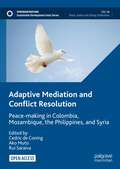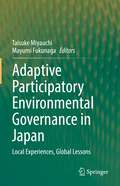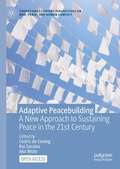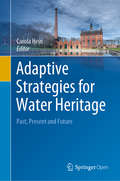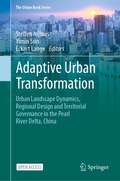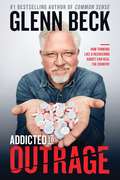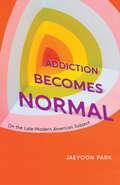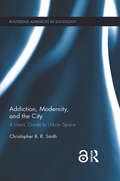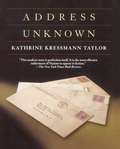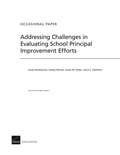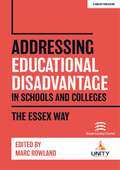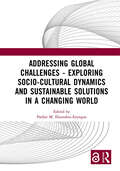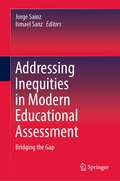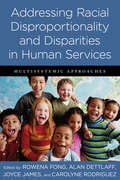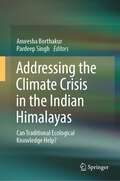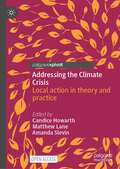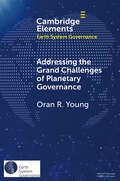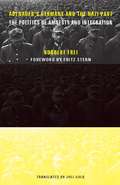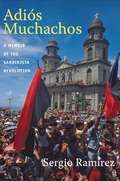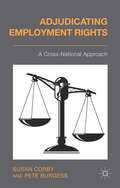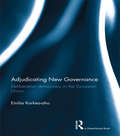- Table View
- List View
Adaptive Mediation and Conflict Resolution: Peace-making in Colombia, Mozambique, the Philippines, and Syria (Sustainable Development Goals Series)
by Cedric De Coning Ako Muto Rui SaraivaThis open access book introduces adaptive mediation as an alternative approach that enables mediators to go beyond liberal peace mediation, or other determined-design models of mediation, in the context of contemporary conflict resolution and peace-making initiatives. Adaptive mediation is grounded in complexity theory, and is specifically designed to cope with highly dynamic conflict situations characterized by uncertainty and a lack of predictability. It is also a facilitated mediation process whereby the content of agreements emerges from the parties to the conflict themselves, informed by the context within which the conflict is situated. This book presents the core principles and practices of adaptive mediation in conjunction with empirical evidence from four diverse case studies – Colombia, Mozambique, The Philippines, and Syria – with a view to generate recommendations for how mediators can apply adaptive mediation approaches to resolve and transform contemporary and future armed conflicts.
Adaptive Participatory Environmental Governance in Japan: Local Experiences, Global Lessons
by Taisuke Miyauchi Mayumi FukunagaThis book contributes to the theoretical and practitioner literature in environmental governance and sustainability of natural resources by linking case studies of the roles of narratives to the three key practices in local environmental governance: socio-political legitimacy in participation; collaboratively creating stakeholder-ness, and cultivating social and ecological capabilities. It provides numerous theoretical insights on legitimacy, adaptability, narratives, process-oriented collaborative planning, and among others, using in-depth case studies from historical and contemporary environmental issues including conservation, wildlife management, nuclear and tsunami disasters, and thus community risk, recovery, and resiliency. The authors are all practitioner-oriented scientists and scholars who are involved as local stakeholders in these practices. The chapters highlight their action and participatory-action research that adds deeper insights and analyses to successes, failures, and struggles in how narratives contribute to these three dimensions of effective environmental governance. It also shows how stakeholders’ kinds of expertise, in a historical context, help to bridge expert and citizen legitimacy, as well as spatial and jurisdictional governance structures across scales of socio-political governanceOf particular interest, both within Japan and beyond, the book shares with readers how to design and manage practical governance methods with narratives. The detailed design methods include co-imagination of historical and current SESs, designing processes for collaborative productions of knowledge and perceptions, legitimacy and stakeholder-ness, contextualization of contested experiences among actors, and the creation of evaluation standards of what is effective and effective local environmental governance.The case studies and their findings reflect particular local contexts in Japan, but our experiences of multiple natural disasters, high economic growth and development, pollutions, the nuclear power plant accident, and rapidly aging society provide shared contexts of realities and provisional insights to other societies, especially to Asian societies.
Adaptive Peacebuilding: A New Approach to Sustaining Peace in the 21st Century (Twenty-first Century Perspectives on War, Peace, and Human Conflict)
by Cedric De Coning Ako Muto Rui SaraivaThis open access book responds to the urgent need to improve how we prevent and resolve conflict. It introduces Adaptive Peacebuilding through evidence-based research from eight case studies across Africa, Asia, the Middle East, and Latin America. It also considers how China and Japan view and practice peacebuilding. The book focuses on how peacebuilders design, implement and evaluate programs to sustain peace, how interactions between external and local actors have facilitated or hindered peacemaking, and how adaptation to complexity and uncertainty occurred in each case study.
Adaptive Strategies for Water Heritage: Past, Present and Future
by Carola HeinThis Open Access book, building on research initiated by scholars from the Leiden-Delft-Erasmus Centre for Global Heritage and Development (CHGD) and ICOMOS Netherlands, presents multidisciplinary research that connects water to heritage. Through twenty-one chapters it explores landscapes, cities, engineering structures and buildings from around the world. It describes how people have actively shaped the course, form and function of water for human settlement and the development of civilizations, establishing socio-economic structures, policies and cultures; a rich world of narratives, laws and practices; and an extensive network of infrastructure, buildings and urban form. The book is organized in five thematic sections that link practices of the past to the design of the present and visions of the future: part I discusses drinking water management; part II addresses water use in agriculture; part III explores water management for land reclamation and defense; part IV examines river and coastal planning; and part V focuses on port cities and waterfront regeneration. Today, the many complex systems of the past are necessarily the basis for new systems that both preserve the past and manage water today: policy makers and designers can work together to recognize and build on the traditional knowledge and skills that old structure embody. This book argues that there is a need for a common agenda and an integrated policy that addresses the preservation, transformation and adaptive reuse of historic water-related structures. Throughout, it imagines how such efforts will help us develop sustainable futures for cities, landscapes and bodies of water.
Adaptive Urban Transformation: Urban Landscape Dynamics, Regional Design and Territorial Governance in the Pearl River Delta, China (The Urban Book Series)
by Steffen Nijhuis Eckart Lange Yimin SunThis open access book provides a cross-sectoral, integrative and multi-scale design and planning approach for adaptive urban transformation of fast urbanising deltas, taking the Pearl River Delta (China) as a case study. Deltaic areas are among the most promising regions in the world. Their strategic location and superior quality of their soils are core factors supporting both human development and the rise of these regions as global economic hubs. At the same time, however, deltas are extremely vulnerable to multiple threats from both climate change and urbanisation. These include an increased flood risk combined with the resulting loss of ecological and social-cultural values. To ensure a more sustainable future for these areas, spatial strategies are needed to strengthen resilience, i.e. help the systems to cope with their vulnerabilities as well as enhance their capacity to overcome natural and artificial threats.The book provides a unique approach that integrates research in urban landscape systems, territorial governance and visualisation techniques that will help to achieve more integrated and resilient deltas. Based on an assessment of the dynamics of change regarding the transformational cycles of natural and urban landscape elements, eco-dynamic regional design strategies are explored to reveal greater opportunities for the exploitation of natural and social-cultural factors within the processes of urban development.
Addicted to Outrage: How Thinking Like a Recovering Addict Can Heal the Country
by Glenn BeckGlenn Beck—author of thirteen #1 New York Times bestsellers—issues a startling challenge to people on both sides of the aisle to give up our addiction to outrage. <P><P>America is addicted to outrage, we’re at the height of a twenty-year bender, and we need an intervention. In Addicted to Outrage, New York Times bestselling author Glenn Beck addresses how America has become more and more divided—both politically and socially. Americans are now less accepting, less forgiving, and have lost faith in many of the country’s signature ideals, he says. We are quick to point a judgmental finger at the opposing party, are unwilling to doubt their own ideologies, and refuse to have any self-awareness whatsoever. <P><P>Beck states that our current downward spiral will ultimately lead to the destruction of everything America has fought so hard to preserve. This is not simply a Republican problem. This is not simply a Democratic problem. This is everyone’s burden, and we need to think like recovering addicts and change. With a nod to a traditional twelve-step program, each chapter encourages self-reflection and growth and shows us the way to a more hopeful, happy future. <P><P>Beck draws from his own life experiences and includes relevant examples for each step, from families who learned to forgive killers to remembering to believe in something greater than ourselves to understanding the importance of humility. Addicted to Outrage is a timely and necessary guide for how Americans, right and left, must change to survive. <P><b>A New York Times Bestseller</b>
Addiction Becomes Normal: On the Late-Modern American Subject
by Jaeyoon ParkAddiction is now seen as an ordinary feature of human nature, an idea that introduces new doubts about the meaning of our desires. Over the last forty years, a variety of developments in American science, politics, and culture have reimagined addiction in their own ways, but they share an important understanding: increasingly, addiction is described as normal, the natural result of a body that has been exposed to potent stimuli. This shift in thinking suggests that addiction is a condition latent in all of us, a common response to a society rich in thrills. In Addiction Becomes Normal, Jaeyoon Park provides a history and critical analysis of the normalization of addiction in late-modern American society. By exploring addiction science, diagnostic manuals, judicial reform, and public health policy, he shows how seeing addiction as normal has flourished in recent decades and is supported throughout cultural life in the United States by the language of wellness, psychotherapy, and more. Building on Michel Foucault’s depiction of the human figure, Park argues that this shift reflects the emergence of a new American subject, one formed by the accretion of experiences. This view of the human subject challenges the idea that our compulsions reflect our characters, wills, or spirits. For if addiction is an extreme but ordinary attachment, and if compulsive consumption resembles healthy behavior, then desire is no longer an expression of the soul so much as the pursuit of a past reward. A perceptive work of recent history and political theory, Addiction Becomes Normal raises new questions about what it means to be human in America today.
Addiction, Modernity, and the City: A Users’ Guide to Urban Space (Routledge Advances in Sociology)
by Christopher B.R. SmithExamining the interdependent nature of substance, space, and subjectivity, this book constitutes an interdisciplinary analysis of the intoxication indigenous to what has been termed "our narcotic modernity." The first section - Drug/Culture - demonstrates how the body of the addict and the social body of the city are both inscribed by "controlled" substance. Positing addiction as a "pathology (out) of place" that is specific to the (late-)capitalist urban landscape, the second section - Dope/Sick - conducts a critique of the prevailing pathology paradigm of addiction, proposing in its place a theoretical reconceptualization of drug dependence in the terms of "p/re/in-scription." Remapping the successive stages or phases of our narcotic modernity, the third section - Narco/State - delineates three primary eras of narcotic modernity, including the contemporary city of "safe"/"supervised" consumption. Employing an experimental, "intra-textual" format, the fourth section - Brain/Disease - mimics the sense, state or scape of intoxication accompanying each permutation of narcotic modernity in the interchangeable terms of drug, dream and/or disease. Tracing the parallel evolution of "addiction," the (late-)capitalist cityscape, and the pathological project of modernity, the four parts of this book thus together constitute a users' guide to urban space.
Adding Indonesia to the Global Projection Model
by Charles Freedman Douglas Laxton Michal Andrle Roberto Garcia-Saltos Danny Hermawan Haris MunandarAdding Indonesia to the Global Projection Model
Adding Latin America to the Global Projection Model
by Charles Freedman Douglas Laxton Roberto Garcia-Saltos Jorge Canales Kriljenko Marianne JohnsonAdding Latin America to the Global Projection Model
Address Unknown
by Kathrine Kressmann TaylorA rediscovered classic, originally published in 1938 --and now an international bestseller. When it first appeared in Story magazine in 1938, Address Unknown became an immediate social phenomenon and literary sensation. Published in book form a year later and banned in Nazi Germany, it garnered high praise in the United States and much of Europe. A series of fictional letters between a Jewish art dealer living in San Francisco and his former business partner, who has returned to Germany, Address Unknown is a haunting tale of enormous and enduring impact.
Addressing Challenges in Evaluating School Principal Improvement Efforts
by Laura S. Hamilton Susan M. Gates Susan Burkhauser Ashley PiersonGiven the focus on accountability in education, stakeholders are interested in evaluating whether efforts aimed at improving school leadership show results; the key criteria are student outcomes. This report describes challenges that states, districts, and other entities can expect to encounter as they evaluate efforts targeting school leadership as a way to improve student outcomes and offers suggestions for dealing with those challenges.
Addressing Educational Disadvantage in Schools and Colleges: The Essex Way
by Marc RowlandThe genesis for this book, and the strategy within it, is a longstanding commitment from Essex County Council to improve the life chances and life choices of disadvantaged pupils being educated in Essex.The purpose of the book is to set out a strategic, evidence-informed approach with pupils, families, teachers, leaders, system leaders and wider agencies which puts learners first. This approach is rooted in best practice. It centres on improving the day to day learning experiences of disadvantaged pupils, leading to better long term choice and opportunity. Unity Research School and Essex County Council hope it will support efforts to address the impact of socio-economic disadvantage on learning in schools and colleges nationally.
Addressing Educational Disadvantage in Schools and Colleges: The Essex Way
by Marc RowlandThe genesis for this book, and the strategy within it, is a longstanding commitment from Essex County Council to improve the life chances and life choices of disadvantaged pupils being educated in Essex.The purpose of the book is to set out a strategic, evidence-informed approach with pupils, families, teachers, leaders, system leaders and wider agencies which puts learners first. This approach is rooted in best practice. It centres on improving the day to day learning experiences of disadvantaged pupils, leading to better long term choice and opportunity. Unity Research School and Essex County Council hope it will support efforts to address the impact of socio-economic disadvantage on learning in schools and colleges nationally.
Addressing Global Challenges - Exploring Socio-Cultural Dynamics and Sustainable Solutions in a Changing World: Proceedings of International Symposium on Humanities and Social Sciences (ISHSS 2023, August 11-13, 2023, Macau, China)
by Eloundou-Enyegue, Parfait M.The International Symposium on Humanities and Social Sciences: Addressing Global Challenges-Exploring Socio-Cultural Dynamics and Sustainable Solutions in a Changing World (ISHSS 2023) unfolds as a crucial academic undertaking, centred around the overarching theme of intellectual synergy and inquiry. This conference serves as a vibrant forum, facilitating discussions on a wide array of subjects within the realms of humanities and social sciences.The curated collection of proceedings encapsulates an expansive spectrum of subject areas, transcending disciplinary boundaries to encapsulate sociology, anthropology, history, and beyond. The significance of this compilation lies not only in the wealth of knowledge it imparts but also in its potential to resonate with a diverse audience. From academicians to practitioners, the discourse transcends traditional boundaries, offering insights that cater to the intellectual curiosity of a broad audience.The Open Access version of this book, available at www.taylorfrancis.com, has been made available under a Creative Commons Attribution-Non Commercial-No Derivatives (CC-BY-NC-ND) 4.0 license.
Addressing Inequities in Modern Educational Assessment: Bridging the Gap
by Jorge Sainz Ismael SanzThis edited book focuses on the central and up-to-date issues that represent some of the most relevant challenges and limitations of International Learning Assessments (ILSAs). It specifically sheds light on the general effects of the discontinuation of face-to-face education on students at diverse academic levels during the COVID-19 pandemic.Through the lens of the most relevant experts of the field, it highlights the asymmetric effects on students based on family income, education level, or employment, imposing a heavy toll on those with less resources.It raises issues regarding the impact on the mental health of students and education professionals due to school closures. Modern education is shifting its focus from just scores to detailed, qualitative feedback. Such comprehensive insights help students identify both strengths and growth areas, making assessments more constructive.This book is aimed for researchers in the field of educational assessments, graduate and postgraduate students, policy makers, and anyone interested in making informed decisions regarding ILSAs. COVID-19 brought immense educational challenges, it also presented an unprecedented opportunity: to reassess and reform existing systems, steering towards assessments that are both fair and empowering.
Addressing Racial Disproportionality and Disparities in Human Services: Multisystemic Approaches
by James Joyce Rodriguez Alan Fong Rowena Dettlaff CarolyneThe issue of racial disproportionality in the child welfare system, particularly as it impacts African American children and families, has long been a concern to practitioners and policymakers. However, disproportionality is not limited to the African American community. Latino, Native American, Asian American, and Pacific Islander populations experience inequities in treatment. From leading voices on culturally-competent care comes a cutting-edge book that examines disproportionalities across all of these racial and ethnic groups.Eliminating Racial Disproportionality and Disparities examines a wide range of systems that often affect and interact with child welfare. Chapters are devoted to the juvenile justice system, mental health, the courts, education, and healthcare, making it the only book to offer a multisystemic approach to disparities and disproportionality. Filled with in-depth case studies, key terms, study questions, and resources, and written to reflect CSWE-mandated competencies, this expansive book gives students, educators, policymakers, practitioners, and administrators new knowledge for providing culturally competent services while simultaneously addressing disproportionality across various systems of care.
Addressing the Climate Crisis in the Indian Himalayas: Can Traditional Ecological Knowledge Help?
by Pardeep Singh Anwesha BorthakurThis book focuses on the traditional ecological knowledge in addressing the current climate crisis in the Indian Himalayas. Local or indigenous people in the Himalayas, through their low-carbon producing lifestyles, contribute very little to the climate crisis. However, at the same time, they bear the brunt of this crisis way more than many others. It is important to learn about their traditional ways of life and the knowledge that they hold regarding ecology and environment. Traditional ecological knowledge and associated belief systems are given increasing attention across the globe in recent times toward addressing some of the grave environmental concerns. Climate change is one such concern. The rising consideration of concepts such as ethnoecology and ethnobotany signifies the scientific, socio-cultural and economic potential of the traditional ecological knowledge systems. It is indisputable that these knowledge systems have the ability to provide important insights towards tackling many present-day environmental distresses including several climate change challenges. In this book, the authors concentrate on such traditional ecological knowledge systems in the Indian Himalayan region and try to figure out their significance in relation to the modern science. Overall, the authors attempt to write a book where the relevance of traditional ecological knowledge systems could be addressed and communicated to a larger audience—both academic scientific and non-academic.
Addressing the Climate Crisis: Local action in theory and practice
by Amanda Slevin Matthew Lane Candice HowarthThis open access book brings together a collection of cutting-edge insights into how action can and is already being taken against climate change at multiple levels of our societies, amidst growing calls for transformative and inclusive climate action. In an era of increasing recognition regarding climate and ecological breakdown, this book offers hope, inspiration and analyses for multi-level climate action, spanning varied communities, places, spaces, agents and disciplines, demonstrating how the energy and dynamism of local scales are a powerful resource in turning the tide. Interconnected yet conceptually distinct, the book’s three sections span multiple levels of analysis, interrogating diverse perspectives and practices inherent to the vivid tapestry of climate action emerging locally, nationally and internationally. Delivered in collaboration with the UK’s ‘Place-Based Climate Action Network’, chapters are drawn from a wide range of authors with varying backgrounds spread across academia, policy and practice.
Addressing the Grand Challenges of Planetary Governance: The Future of the Global Political Order (Elements in Earth System Governance)
by Oran R. YoungThe world today confronts unprecedented needs for governance having profound implications for human well-being that are difficult - perhaps impossible - to address effectively within the prevailing global political order. This makes it pertinent to ask whether we must assume that the global order will continue during the foreseeable future to take the form of a state-based society as we think about options for addressing these challenges. Treating political orders as complex systems and drawing on our understanding of the dynamics of such systems, the author explores the prospects for a critical transition in the prevailing global political order. Individual sections analyze constitutive pressures, systemic forces, tipping elements, the effects of scale, the defining characteristics of potential successors to the current order, and pathways to a new order. In the process, seeking to make a more general contribution to our understanding of critical transitions in large political orders.
Adenauer's Germany and the Nazi Past: The Politics of Amnesty and Integration
by Norbert FreiOf all the aspects of recovery in postwar Germany perhaps none was as critical or as complicated as the matter of dealing with Nazi criminals, and, more broadly, with the Nazi past. While on the international stage German officials spoke with contrition of their nation's burden of guilt, at home questions of responsibility and retribution were not so clear. In this masterful examination of Germany under Adenauer, Norbert Frei shows that, beginning in 1949, the West German government dramatically reversed the denazification policies of the immediate postwar period and initiated a new "Vergangenheitspolitik," or "policy for the past," which has had enormous consequences reaching into the present. Adenauer's Germany and the Nazi Past chronicles how amnesty laws for Nazi officials were passed unanimously and civil servants who had been dismissed in 1945 were reinstated liberally—and how a massive popular outcry led to the release of war criminals who had been condemned by the Allies. These measures and movements represented more than just the rehabilitation of particular individuals. Frei argues that the amnesty process delegitimized the previous political expurgation administered by the Allies and, on a deeper level, served to satisfy the collective psychic needs of a society longing for a clean break with the unparalleled political and moral catastrophe it had undergone in the 1940s. Thus the era of Adenauer devolved into a scandal-ridden period of reintegration at any cost. Frei's work brilliantly and chillingly explores how the collective will of the German people, expressed through mass allegiance to new consensus-oriented democratic parties, cast off responsibility for the horrors of the war and Holocaust, effectively silencing engagement with the enormities of the Nazi past.
Adherence to Antiretroviral Therapy among Perinatal Women in Guyana: Challenges and Lessons for Developing Nations
by Debbie VitalisThe book documents the history of the prevention-of-mother-to child transmission of HIV (PMTCT) program in Guyana, as well as the impact of HIV on pregnant and postpartum women’s adherence to antiretroviral therapy (ART). The book shows research work by reviewing the literature to investigate relevant adherence studies, presenting in-depth interviews on adherence perspectives of clinic patients and healthcare providers, and a cross-sectional descriptive study of pregnant women that investigated general adherence to pregnancy-related behaviours and ART, and the efficacy of a theoretical model (Health Belief Model) to understand and predict ART adherence within this group. Author discusses the factors affecting ART adherence among pregnant and postpartum women, since existing studies may not account for cultural and other local variations. The findings provide insight into the local situation, and will also inform policy and practice in Guyana, and the wider Caribbean Community (CARICOM).
Adiós Muchachos: A Memoir of the Sandinista Revolution
by Sergio Ramírez Stacey Alba SkarAdiós Muchachos is a candid insider's account of the leftist Sandinista revolution in Nicaragua. During the 1970s, Sergio Ramírez led prominent intellectuals, priests, and business leaders to support the Sandinista National Liberation Front (FSLN), against Anastasio Somoza's dictatorship. After the Sandinistas overthrew the Somoza regime in 1979, Ramírez served as vice-president under Daniel Ortega from 1985 until 1990, when the FSLN lost power in a national election. Disillusioned by his former comrades' increasing intolerance of dissent and resistance to democratization, Ramírez defected from the Sandinistas in 1995 and founded the Sandinista Renovation Movement. In Adiós Muchachos, he describes the utopian aspirations for liberation and reform that motivated the Sandinista revolution against the Somoza regime, as well as the triumphs and shortcomings of the movement's leadership as it struggled to turn an insurrection into a government, reconstruct a country beset by poverty and internal conflict, and defend the revolution against the Contras, an armed counterinsurgency supported by the United States. Adiós Muchachos was first published in 1999. Based on a later edition, this translation includes Ramírez's thoughts on more recent developments, including the re-election of Daniel Ortega as president in 2006.
Adjudicating Employment Rights
by Susan Corby Pete BurgessAdjudicating Employment Rights compares and analyses institutions for resolving employment rights disputes in ten countries. In addition to detailed individual chapters, the study offers a theoretical perspective and an evaluation of national institutions against key yardsticks.
Adjudicating New Governance: Deliberative Democracy in the European Union
by Emilia Korkea-ahoThis book engages with and advances the current debate on new governance by providing a much-needed analysis of its relationship with the courts. New modes of governance have produced a plethora of instruments and actors at various levels that present a challenge to more traditional forms of command-and-control regulation. In this respect, it is commonly maintained that new governance generally – and political experimentation more broadly – weakens the power of the courts, producing a legitimacy problem for new forms of governance and, perhaps more fundamentally, for law itself. Focusing on the European Union, this book offers a new account of the role of the courts in new governance. Connecting new governance with the conception of deliberative democracy, this book demonstrates how the role of courts has been transformed by the legal and political experimentation currently taking place in the European Union. Drawing on a series of case studies, it is argued that, although deliberations in governance frameworks provide little by way of hard, binding law, these collaborative frameworks nevertheless condition judicial decision making. With far-reaching implications for how we understand the justiciability of ‘soft law’, participation rights, the legitimacy of governance measures, and the role of courts beyond the nation-state, this book argues that, far from undermining the power of the courts, governance regimes assist their functioning. Its analysis will therefore be of considerable interest for lawyers, political scientists and anyone interested in the transformation of the judiciary in the era of new governance.
